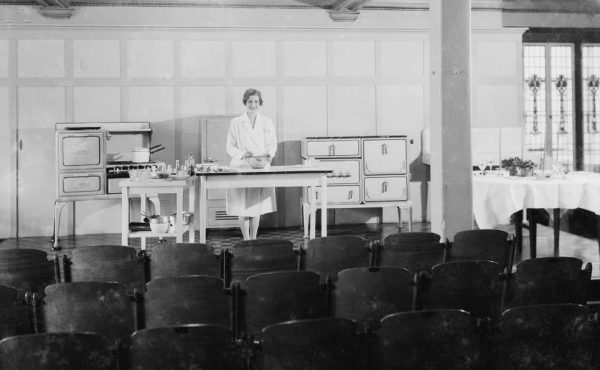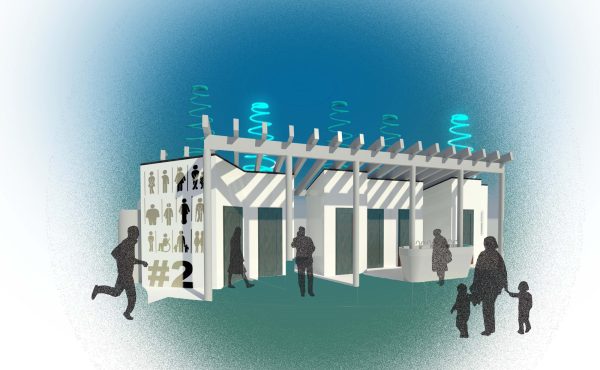
The following is a reprint of my Eye Weekly Psychogeography column. It’s based entirely on you not wanting Rob Ford to be mayor of Toronto. If you want him to be your mayor, that’s cool, but you won’t like this column. Voter turnout in Calgary last night was an amazing (sadly) 53%. Toronto is on track to be well below that — let’s try not to do that. Vote! Photo by Toban Black.
![]()
In 2008, comedian Sarah Silverman headed up a viral video initiative called “The Great Schlep” that encouraged her fellow Jews to call or go visit their Nana, Bubbie or Zadie in Florida and get them to vote for Barack Obama in the 2008 presidential election. Florida, being a swing state, could decide the Presidency for the entire country, as it did in 2000 with Bush vs Gore and, as Silverman saw it, the Jewish grandparents held the key (and, based on the outcome, perhaps did). Toronto isn’t a swing state and neither Pantalone nor Smitherman is an Obama, but we need to get out the vote now more than ever.
This campaign has depressed much of the city and maybe you too. Except for the true believers in each camp, lots of Torontonians are only reluctantly supporting a candidate or wistfully wishing for a “none-of-the-above” magic municipal reset button. With such an uninspiring electoral landscape, the risk for low voter turnout is great. Municipal elections already have the lowest, embarrassing-for-a-democracy turnout levels. In 2006, there were 1.42 million eligible voters in Toronto and only 584,000 ballots cast. That’s a 41 per cent turnout. At the federal and provincial levels, turnout is generally over 50 per cent. Strangely, municipal politics is the level of government that affects our day-to-day lives the most, yet it has the lowest level of participation.
What Toronto needs right now is its own Great Schlep, but instead of talking to just our grandparents, we need to talk to everybody we know within the city limits and make sure they actually vote. (If you’ve read this far you probably are planning to vote. If not, then: hey, you, get out and vote on Oct. 25.) Do what you were taught not to do and bring up politics whenever and wherever: at a civilized dinner party; during polite conversation; in the steam room at your gym; even at work. Threaten to unfriend people on Facebook if they don’t vote (you’ve unfriended for far less, certainly). Forget whatever social transgressions you’ll make by doing so, because the fate of Toronto is at stake. What could be more important? The city is your living room. You want it to be nice? It’s up to you to do something.
Also unlike the Florida Great Shlep, Toronto’s wouldn’t be based on geography. If you don’t want Ford to win, his support goes in all directions and his voters live downtown, uptown; are suburban and urban. Once you’ve got people voting, you can stop threatening them with shunning. Tell them what you like about Toronto (a radical thing to do in this election), how you want it to feel and look every day. What kind of things do you want near your house? What’s the ideal experience of getting to work or school or church for you? Then ask people what they want their city to look like. Once we’re beyond hyperventilated election rhetoric, even somebody from opposite your political view likely has a Toronto vision closer to yours than it is different.
Once you’re talking, ask them to look at what the candidates are saying and what they stand for. When you make the case for Toronto, and the reasons you love it, the choices should become clearer. Or at least narrower. But then, there is still a choice and the anyone-but-Ford vote can easily be split, letting him come up the centre.
Voter reform, the kind advocated by local activist Dave Meslin and his “Better Ballots” initiative (now called RaBIT — Ranked Ballot Initiative)— pushing for reforms that would make it hard for a candidate to win with under 40 per cent of the popular vote, as is currently possible — and likely) won’t happen in the next two weeks, so it’s time to be strategic.
The true believers behind candidates, as well as ideologues and utopians, who would not benefit from strategic voting will tell you it’s a bad idea. Sure, it’s depressing and it breeds political cynicism like nothing else. It’s awful, not being true to what both your heart and mind is telling you. But then there’s reality: across the political spectrum, we’re left with candidates who haven’t excited us. The left-of-centre Miller regime put its succession faith in weak candidates who either committed spectacular political suicide or have failed to grab the wider public’s attention, and the right-of-centre haven’t been able to field a candidate who they could fully get behind (this is why John Tory’s name was tossed into the ring over and over).
So, who to endorse in this critical but meh-inspiring election? Vote for number two. That is, whoever is polling behind Ford on election day is who I’ll vote for. Then I’ll go say a little prayer, take a walk, and remind myself why we’re called Toronto the Good. With the anti-Ford vote at risk of being split, this is the only way to coalesce the opposition votes. It’s not pretty. A smart city like Toronto deserves better and it feels hard to do, but anything else leads to a split.
The winner will know that lots of folks reluctantly came around to them and, as they say, held their nose and voted. In an ideal world, that candidate would recognize that Toronto’s centre, left and right, came around and reluctantly placed their trust in them for four years. In that time, other, more appealing candidates will emerge, one hopes. Our new mayor will need to appeal to these swing voters and govern Toronto accordingly. Ideally. So vote, and get your people to vote or else Toronto will get the mayor it deserves — honestly.




7 comments
And if people say they wanted employment opportunities near their homes, how would you respond Shawn?
Glen,
How is Rob Ford in any better a position to create decent jobs in the outer-416? Does he strike you as the type of politician who will honestly tell his constitutents that they must balance commerical property taxes with a residential property tax hike? How much control do you think he (or any mayor) has over global macroeconomic factors that have had a profound effect on job growth in Toronto?
Leonard,
Rob Ford, and recently George Smitherman have both indicated that property taxes need to be lowered (not raised more slowly as the current administration has done) in order to facilitate job creation in the city. During an election campaign I don’t think that they would be shouting this from roof tops as it implies that the residential class will have to make up for it. Which would translate into a platform of, we will raise your taxes. Not something that is conducive to getting elected.
No one has championed this issue. Toronto has an embarrassing level of unemployment, with a trend that is alarming. I cannot unequivocally say that that Rob Ford would be better than George Smitherman. I can easily speculate that both would be better than Joe Pantalone. With the opinion that any meaningful re-balancing will not take place in the current climate there is some practical reasoning that the candidate that proposes to spend the least will produce the greatest benefit regarding this issue. As a side effect though, not as a direct policy. Now if we look at the financial platforms (which all leave much to be desired) we still see that Smitherman’s is predicated on many on time sources of revenue. If I, as someone who worries about the long term fiscal health of Toronto, would like to see growth in the area of assessment that drives revenue, not the side that drives expenditures (residential) , my choice whittles down to one. Is it perfect? Far from it. Is it rational? IMHO, yes.
Regarding global macroeconomic factors, I am reasonably well versed in the area. Lets set the record straight here, Toronto has enough of its home grown problems to deal with before scapegoating on global issues. . The city can have very little influence over global issues. It can, and does, have the last word on regional ones. In this respect the city has been a failure. It was city policy, not global factors, that had the city loose 100,000 jobs while the surround region created 800,000. It was city policy that made building commercial space (and therefore employment opportunity) unprofitable.
Actually, 41% turnout is still pretty high for North America. New York’s last mayoral election was 26% and that was a reasonably competitive race.
By the way, if you are depressed about splitting the vote, here is a great article to read:
http://www.newyorker.com/arts/critics/books/2010/07/26/100726crbo_books_gottlieb
Many voters in my provincial riding, myself included, have already held their nose while voting for Smitherman, the year he was elected an M.P.P. Apparently you can build an entire political career on voters fearing the worst.
No. The winner will not care if votes were given grudgingly, even if he knows that they were. Any vote for Smitherman will be counted as a if was given as without ambiguities.
Even now, Smitherman is playing up John Sewell’s “If you consider this to be an endorsement. So be it” and councilor Vaughan’s “I can work with Smitherman” as examples of steadfast approval, even though these endorsements were given with extreme reluctance. That is precisely how Smitherman will treat our votes.
Worse still, Smitherman will also count Ford’s votes as part of the mandate for his fiscally conservative platform.
Having a super-charged Smitherman with a huge mandate for fiscal conservative policies, is just as dangerous as having a lame duck Ford plowing his way through an unhelpful council, when it comes down to the brass tacks of what will be cut. Probably it will be worse.
Pantalone is the only vote that does not endorse the Ford plan that Smitherman has copied, nearly point for point, except in degree.
Glen,
Various business interests have been pitching the idea that lower taxes creates jobs by creating more fluid capital for investment. We have been hearing this since about the time that Mulroney put the Free Trade Agreement into place. To protect the Ontario manufacturing sector, it was deemed that corporate taxes needed to be reduced in order to save the manufacturing sector and create jobs.
This has been the received wisdom for many years. Sorry to say, the “Market” doesn’t actually seem to work that way, and the once substantial Ontario manufacturing sector is all but dead, and would be dead if we were not constantly funneling over money to the auto-giants who bribe us by threatening to move out and kill more jobs on a regular basis.
Oddly, what is actually holding what is left of the Ontario economy together are the union and government pension funds such as OMERS and OTPP, which account for nearly half of the entire Ontario economy. These investment giants repatriate monies from profitable enterprises world wide, and reinvest them in Ontario by government mandate, since they are required to keep a certain amount of investment here by law.
Other corporate capital has for the most part fled the province, and all that remains of that are service industry giants.that profit by servicing the community, and the resource giants that need to be here because the resources here.
In other words reducing tax rates to create investment is an idealistic theory that does not seem to bear out when exposed to reality.